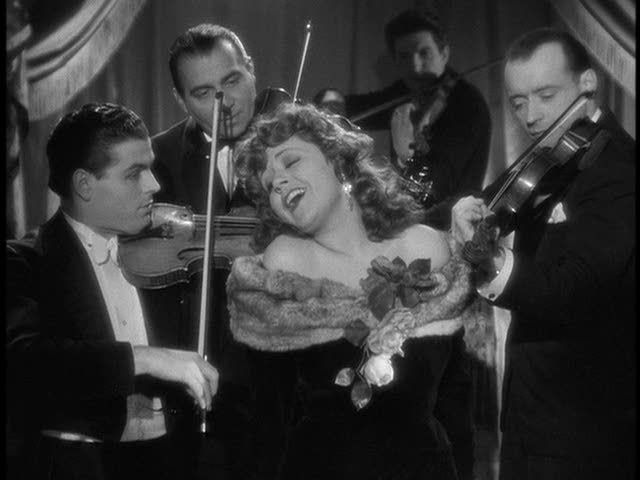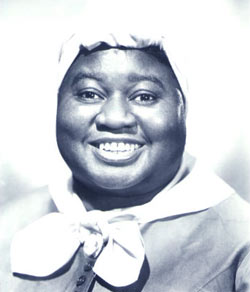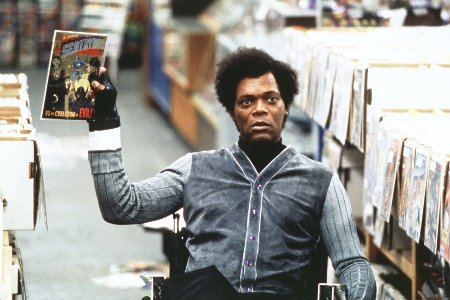 Porky In Wackyland
Porky In Wackyland may just be the strangest cartoon to come out of the Warner Brothers studio, and that's really saying something in a catalog filled with strange little films. In this Robert Clampett-helmed production, Porky Pig heads off in a bouncy propeller plane towards the heart of "darkest Africa" (which is of course preceded by "dark Africa" and "darker Africa") in search of the last of the Do-Do birds. He lands in Wackyland ("population 100 nuts and a squirrel") and is almost immediately subjected to a barrage of non-sequiturs and bizarre characters. There's a creature that plays flute by blowing its nose, a strange rabbit dangling in mid-air from a swing that seems to be threaded through its own ears, an angry criminal imprisoned behind a free-floating barred window that he holds in his hands, and a cop with a wheel for legs, who rides up to assault the prisoner. There's also a three-headed monstrosity based on the Three Stooges, with the three heads violently arguing in a squeaky abstract language, which is translated by a long-nosed little creature who runs up to the foreground of the image: "He says his mother was scared by a pawnbroker's sign." Huh? Porky is confronted by all this almost as soon as he arrives, when the lunatic sunrise (the sun is lifted above the horizon by a tower of stacked creatures, with the top one holding it up) signals the start of a new day in Wackyland. This kind of abstract nonsense drives the film, with the same kind of absurdist sense of humor and fluid flow between unrelated images that propelled such Surrealist films as
Un Chien Andalou.
His search for the Do-Do eventually leads him to the unusual bird, but it proves to be much more than he bargained on, as the Do-Do attacks him with lunatic glee and skillfully evades capture. The bird breaks every rule of reality, even of cartoon reality. At one point, the Do-Do pulls out a pencil and draws a door in mid-air, which then takes on tactile form. Obviously, the expected next step in a Warner cartoon would be for the bird to open the door and run through, but instead he reaches down and lifts up the bottom edge of the door like a curtain, revealing it as rubbery and malleable. He darts underneath and lets it snap back into place for Porky to crash into it. The Do-Do represents a fracture even in the loose rules of the Looney Tunes cartoons; this is a creature that is entirely illogical and surrealistic even in relation to illogical standards. The Looney Tunes cartoons always flirted with surrealism and other disjunctions of narrative logic, but never more so than in this 'toon, which wantonly breaks all the rules and doesn't bother to create any new ones. Wackyland is a totally free world, a masterfully executed Surrealist landscape in which anything can and does happen.
The remake of
Porky In Wackyland,
Dough For the Do-Do, was made a decade later in color by Fritz Freleng, and it revisits the crazed environs of Wackyland with only a few essential changes. The switch to color is of course good enough reason for a remake, and none of the black and white Looney Tunes would seemingly benefit so much from added color. In Freleng's version, the bizarre inhabitants of Wackyland are given new life with bright color schemes, though the character designs are basically the same as in Clampett's original film, since much of the original animation is reused and colorized. Only Porky looks different, taking into account the evolution of his character design in the years between the two cartoons. The plot is more or less the same, too. Freleng's version adds a few new jokes — like a "rubber band" that goes marching by, and a brick with a parachute that drops a second brick hidden inside it — and makes a few changes to the ending, but many other scenes are shot-for-shot remakes of the Clampett film. Nevertheless, the first scenes in Wackyland don't flow as well as they do in Clampett's original, in which there was a real sense of the camera panning with Porky's stunned gaze across this awe-inspiring landscape. Here, the reused footage makes the edits necessarily a bit more abrupt, and the unity of space between Porky and the wacky world he's experiencing is destroyed.
One other thing that Freleng changes is even more substantial. His later version of Wackyland noticeably incorporates the visual influence of Salvador Dali, so that Wackyland begins to look like a Surrealist painting. The opening titles provide a clue right away, with Dali's trademark melting clocks draped over a tree on the title card. This influence is woven into the film's landscape, as well, with Dali's crutches and warped surfaces appearing strewn across the screen. At one point, where in Clampett's film the Do-Do ran up a curved tree and then along the underside of its branch, in this new 'toon the bird runs up a curved surface supported by a Daliesque crutch. On one level, this art-referencing is a fun game, and it was probably many kids' first exposure to Surrealist imagery, even if it's pop Surrealism filtered through the Warner aesthetic. But in a deeper way, this bastardized Surrealist Wackyland is a disappointment in comparison to the original. Clampett's Wackyland was a genuinely original creation, and a true Surrealist masterpiece even if he wasn't aiming for Surrealism (and I'm by no means sure how aware the 30s Warner crew were of external art movements). By bolstering Clampett's vision with a kind of premade Surrealism imported from Dali, Freleng dilutes the ingenuity and visual brilliance of the original short, reducing it to a clever referential game rather than a truly original work invented out of whole cloth. Clampett's film is a cartoon masterpiece; Freleng's is something less, a clever pastiche, still enjoyable but not as jaw-droppingly inventive as its predecessor.
Henri-Georges Clouzot's
Quai des orfèvres is ostensibly a detective story and a murder mystery, but it's not a very good one. At least, not on the terms by which such mysteries are usually judged. Thankfully, the film has a lot more to offer besides mystery. Jenny Lamour (Suzy Delair) is a nightclub singer with a jealous pianist husband, Maurice (Bernard Blier), who she loves and is faithful to despite his periodic jealous rages and his constant suspicion (not to mention his general frumpiness, a stark contrast to her luscious pin-up beauty). Jenny is also ambitious, though, and she accepts the attentions of the lascivious movie mogul Brignon (Charles Dullin). She naïvely believes that she can attain fame without giving in to the producer's notorious penchant for bedding his stars. Obviously, things go badly awry, and on the night Brignon turns up dead, both Jenny and the jealous Maurice have been at Brignon's home at different times, with flimsy but convoluted alibis to cover up their activities. Their mutual friend Dora (Simone Renant) has also been at the house, helping Jenny by erasing fingerprints and retrieving a piece of clothing left behind. All three naturally become suspects in the murder as the plot unravels, and the dogged police detective Antoine (Louis Jouvet) trails the clues and slowly undoes their alibis.
The problem with this scenario, as a detective story, is that Clouzot makes no attempt to maintain any sort of traditional suspense or mystery in the film's construction. The first forty minutes of the film are concerned entirely with the three prime suspects, their relationships, and the world of the entertainment industry that they belong to and the small Paris clubs they perform at. Clouzot's interest in this milieu is almost anthropological, developing an entire bustling world of singers, dancers, and oddball performers, like a troupe of gymnastic dogs. An early scene traces the development of Jenny's signature song, with a fluid montage that shows her performing the song in informal practice, club auditions, an on-stage rehearsal, and finally, glamorously dolled up, belting out the number as she shakes her hips before a live audience. Just as importantly, Clouzot is interested in the troubled but genuinely loving domestic relationship between Jenny and Maurice. Maurice is a balding, stocky little loser, sloppy-looking with his perpetually wrinkled clothes and his gloomy stare. He's a miserable man who somehow earned the love of a vivacious, sexy woman, and his knowledge that he's with a woman far above his level has seemingly only made him more miserable. He's consumed by jealousy, and even the most innocent chatter with the old men around the club inflames his rage. Why Jenny ever fell in love with this dopey nothing of a guy is a mystery bigger than anything in the film's main plotline, but then love is always a mystery anyway, so Clouzot gets away with the incongruity. In any case, Jenny is unrelentingly faithful and loving, though she's not above a little innocent flirtation.
The film's focus on Jenny and Maurice (and, tangentially, the perpetual third wheel Dora) encompasses the night of the killing as well, and by the time detective Antoine shows up, the audience is already pretty sure who killed the old guy (although, as everyone knows in mysteries, if you don't see it done on screen, it didn't happen the way you think). Antoine's attempts to uncover the truth of that night are therefore rather perfunctory, from the audience's point of view — we've already seen much of what happened, we know exactly the weak points in each character's alibis, and we know the steps Antoine will have to take to uncover their lies. It's only a question of whether he'll figure it out, and how quickly. To make matters worse, Clouzot bails everyone out with a final-moment revelation that shifts the blame entirely off the central trio to a character so far on the plot's periphery that he was barely in the film prior to that point. It's the most elementary of mystery plotting blunders, the third act revelation that makes everything that came before it entirely irrelevant.
Except that in this case, it's not a blunder. Clouzot
wants to enforce the point that everything happening in this film is irrelevant. In many ways, his interest in the procedures of Antoine's investigation evinces the same anthropological focus on process that he dedicated to his exploration of the music halls. Justice as pursued by Antoine is a slippery and elusive prey, and while he's not exactly inept, he's certainly lazy, and eager to get back to his half-breed son, who he brought back from the African colonies with him. He pursues clues halfheartedly, and mostly just takes the ones that leap out in front of him. He cheerfully admits that his own raincoat was stolen from him right in the police station, with no sign of the thief, and yet once he gets the idea that Maurice killed Brignon, he latches onto the hapless man with a pitbull-like tenacity. If Clouzot's probing into the world of entertainment is largely brimming with light and vigor — especially the joyousness of Jenny's kitschy but sensual performances — his vision of the law and civil institutions is much darker. Antoine is seen as something of a necessary evil in the film. He's not a bad guy, in the same way that the jealous Maurice isn't such a bad guy, but the film suggests that the good and innocent can have as much to fear from the law as the wicked. Coming on the heels of World War II and the French experience of Nazi "law and order," this point was especially salient. The deus ex machina ending takes some of the heat off Antoine, allowing for a "happy" resolution, but one senses that in a more realistic film, Maurice would've been sent to his death for a crime he didn't commit.
The ending does prevent the film from being completely satisfying, as do a couple of earlier scenes when the script descends into exposition through dialogue — especially a lengthy scene where Antoine expounds on his whole past to an underling, for seemingly no more reason than to fill the audience in on his back story. Thankfully, scenes like this are rare, and Clouzot mostly allows the accumulation of details and the nuances of the actors' performances to complete the picture of these characters and their worlds. It's a film that adds up to much more than the sum of its parts, as Clouzot balances his forays into the police procedural and the Parisian music hall scene, the relationship between Maurice and Jenny, and the film's overarching questions about justice, the law, love, and the structure of society. Clouzot, known for his darkness and cynicism, here allows those elements of his philosophy to coexist with light, music, and love, and the interactions between the two opposing forces provide the film's dramatic tension in the absence of a truly satisfying thriller story.























 Sam's Jheri Curl in "Pulp Fiction" .
Sam's Jheri Curl in "Pulp Fiction" .
 Sam's old man grey receding do in "Black Snake Moan".
Sam's old man grey receding do in "Black Snake Moan".









 The Great Debaters--By D. Yobachi Boswell
The Great Debaters--By D. Yobachi Boswell John Singleton is set to direct a feature adaptation of "The A-Team".
John Singleton is set to direct a feature adaptation of "The A-Team". 




